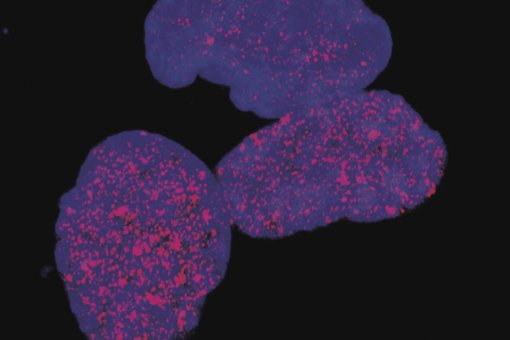Images
Participants


Contact

Researchers unveil a mechanism responsible for halting protein synthesis when cells are deprived of nutrients.
The cell regulates its growth by forming various assemblies of RNA polymerase I.
The study has implications for cancer research.
Researchers at the Consejo Superior de Investigaciones Científicas (CSIC) in Madrid and Salamanca and at the Institute for Research in Biomedicine (IRB Barcelona) have unveiled one of the mechanisms by which cells become latent in response to a lack of nutrients. Recently published in the journal eLife, the study paves the way to regulating cell growth and has clear implications for research into new treatments for cancer.
RNA polymerase I synthesises the molecular machinery responsible for producing all cellular proteins. It is a crucial enzyme for the growth of all animals, plants and even fungi. For a cell to grow, RNA polymerase I must increase its activity, thus facilitating the production of the proteins required for this process. But when a cell stops growing, it is equally essential that the activity of this enzyme stops. Many cancer cells, for example, show increased and uncontrolled RNA polymerase I activity, which allows them to grow faster and to increase the size of the tumour. Given this observation, scientists and the pharmaceutical industry are channelling efforts into ways to regulate RNA polymerase I activity and thus halt tumour growth.
In 2013, the team headed by Carlos Fernández Tornero at CSIC’s Centro de Investigaciones Biológicas discovered the atomic structure of RNA polymerase I in its inactive state. They have now managed to decipher how this enzyme is activated and deactivated. To this end, they have combined new key structural studies with advanced techniques used for molecular analysis, genetic engineering, and live cell microscopy, with the collaboration of the groups headed by Olga Calvo at the CSIC-USAL Instituto de Biología Funcional in Salamanca and Oriol Gallego at IRB Barcelona, respectively.
“In a healthy cell, growth is highly regulated and it only happens in specific circumstances,” says Oriol Gallego, co-leader of the study. In fact, most cells in an adult human don’t grow or divide further once they have been produced. So how does a cell switch off the machinery responsible for its growth? “Using the technology developed by our group and the microscopy facility at IRB Barcelona, we have been able to identify this formerly unknown mechanism,” explains Gallego.
“We were working on new forms of RNA polymerase I, when we made a surprising discovery, namely that this enzyme inhibits itself when the cell is deprived of nutrients,” explains Irene Pazos, IRB Barcelona PhD student, who has been involved in this study.
The cell responds to nutrient availability by forming various assemblies of RNA polymerase I. When there is a lack of nutrients, two copies of the enzyme bind and inactivate each other. In contrast, when the cell has access to nutrients and in order to continue growing, RNA polymerase I is released and activated to produce new proteins. “By regulating RNA polymerase I, we may find the way to halt cell proliferation,” says researcher Carlos Fernández Tornero.
Reference article:
E. Torreira, J.A. Louro, I. Pazos, N. González-Polo, D. Gil-Carton, A.G. Duran, S. Tosi, O. Gallego, O. Calvo, C. Fernández-Tornero.
The dynamic assembly of distinct RNA polymerase I complexes modulates rDNA transcription.
eLife (2017) doi: 10.7554/eLife.20832
About IRB Barcelona
Created in 2005 by the Generalitat de Catalunya (Government of Catalonia) and University of Barcelona, IRB Barcelona is a Severo Ochoa Centre of Excellence, a seal that was awarded in 2011. The institute is devoted to conducting research of excellence in biomedicine and to transferring results to clinical practice, thus improving people’s quality of life, while simultaneously promoting the training of outstanding researchers, technology transfer, and public communication of science. Its 23 laboratories and seven core facilities address basic questions in biology and are orientated to diseases such as cancer, metastasis, Alzheimer’s, diabetes, and rare conditions. IRB Barcelona is an international centre that hosts more than 400 employees and 36 nationalities. It is located in the Barcelona Science Park. IRB Barcelona forms part of the Barcelona Institute of Science and Technology (BIST) and the “Xarxa de Centres de Recerca de Catalunya” (CERCA).
About IRB Barcelona
The Institute for Research in Biomedicine (IRB Barcelona) pursues a society free of disease. To this end, it conducts multidisciplinary research of excellence to cure cancer and other diseases linked to ageing. It establishes technology transfer agreements with the pharmaceutical industry and major hospitals to bring research results closer to society, and organises a range of science outreach activities to engage the public in an open dialogue. IRB Barcelona is an international centre that hosts 400 researchers and more than 30 nationalities. Recognised as a Severo Ochoa Centre of Excellence since 2011, IRB Barcelona is a CERCA centre and member of the Barcelona Institute of Science and Technology (BIST).




